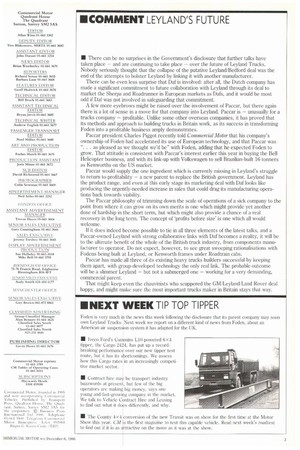• There can be no surprises in the Government's disclosure
Page 5

If you've noticed an error in this article please click here to report it so we can fix it.
that further talks have taken place — and are continuing to take place — over the future of Leyland Trucks. Nobody seriously thought that the collapse of the putative Leyland/Bedford deal was the end of the attempts to bolster Leyland by linking it with another manufacturer.
There can be even less surprise that Daf is involved: after all, the Dutch company has made a significant commitment to future collaboration with Leyland through its deal to market the Sherpa and Roadrunner in European markets as Dafs, and it would be most odd if Daf was not involved in safeguarding that commitment.
A few more eyebrows might be raised over the involvement of Paccar, but there again there is a lot of sense in a move for that company into Leyland. Paccar is — unusually for a trucks company — profitable. Unlike some other overseas companies, it has proved that its methods and approach to building trucks in Britain work, as its success in transforming Foden into a profitable business amply demonstrates.
Paccar president Charles Piggot recently told Commercial Motor that his company's ownership of Foden had accelerated its use of European technology, and that Paccar was ". . . as pleased as we thought we'd be" with Foden, adding that he expected Foden to grow. That attitude is consistent with Paccar's interest earlier this year in buying the Bell Helicopter business, and with its link-up with Volkswagen to sell Brazilian-built 16 tonners as Kenworths on the US market.
Paccar would supply the one ingredient which is currently missing in Leyland's struggle to return to profitability — a new parent to replace the British government. Leyland has the product range, and even at this early stage its marketing deal with Daf looks like producing the urgently-needed increase in sales that could drag its manufacturing operations back towards viability.
The Paccar philosophy of trimming down the scale of operations of a sick company to the point from where it can grow on its own merits is one which might provide yet another dose of hardship in the short term, but which might also provide a chance of a real recovery in the long term. The concept of 'profits before size' is one which all would welcome.
If it does indeed become possible to tie in all three elements of the latest talks, and a Paccar-owned Leyland with strong collaborative links with Daf becomes a reality, it will be to the ultimate benefit of the whole of the British truck industry, from components manufacturer to operator. Do not expect, however, to see great sweeping rationalisations with Fodens being built at Leyland, or Kenworth frames under Roadtrain cabs.
Paccar has made all three of its existing heavy trucks builders successful by keeping them apart, with group-developed technology the only real link. The probable outcome will be a slimmer Leyland — but not a submerged one — working for a very demanding, commercial parent.
That might keep even the chauvinists who scuppered the GIVE/Leyland/Land Rover deal happy, and might make sure the most important trucks maker in Britain stays that way.














































































































